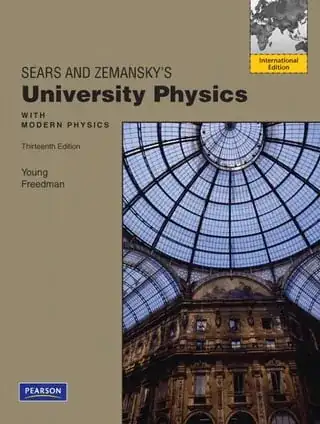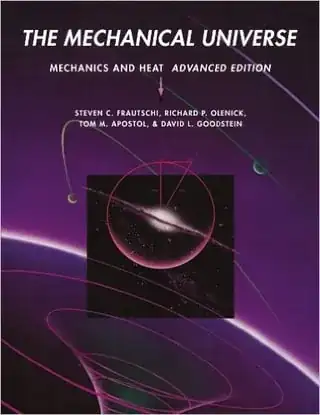What are some good books for learning the concepts of Kinematics, Newton laws, 2D Motion of Object etc.?
14 Answers
One would be hard pushed to find anything better than
- Kleppner and Kolenkow, An Introduction to Mechanics
It is concise and comprehensive and has lots of great exercises.
- 137,480
- 101
- Young and Freedman, Sears and Semansky's University Physics.
This is an excellent book, with pretty much every concept on covered in first year university level physics.
Within the mechanics section ($\simeq$ 500 pages)(which I presume the OP wants), it has chapters on
- Motion along a straight line
- Motion in 2D and 3D
- Newton's laws of motion
- Applying Newton's laws
- Work and kinetic energy
- Potential energy and energy conservation
- Momentum, impulse and collisions
- Rotation of rigid bodies
- Dynamics of rotational motion
- Equilibrium and elasticity
- Fluid mechanics
- Gravitation
- Periodic motion
The other sections are: Waves and Acoustics (2 chapters), Thermodynamics (4 chapters), Electromagnetism (12 chapters), Optics (4 chapters), and finally Modern Physics (8 chapters).
The book has hundreds of worked examples on each topic and around 1000 examples to try without help (half of the solutions are in the back).
In my opinion, it's the best value for money of any physics book in the world.

- 137,480
- 2,313
I would suggest
- David Morin, Introduction to classical mechanics.
It's the best book of mechanics i've ever seen. It's full of solved interesting problem. You can easily see the deep difference between this and other mechanics books.
- 137,480
- 1
- 1
- 2
Try
- I.E. Irodov, Fundamental Laws of Mechanics.
Don't use its problem book as mentioned in a previous answer. The book is written in traditional Russian style, but it will give you clear & super advance idea of mechanics. Its useful to a High School guy as well as for a PhD student.
- 137,480
- 5,130
I learnt mechanics as an undergrad with
- John R. Taylor, Classical Mechanics,
and found it interesting and straightforward. The presentation is wonderful, but most exercises are quite difficult for an undergrad.
- 137,480
- 596
- 3
- 9
Go for
- H.C. Verma, Concepts of Physics
It's a two volume series and has very good conceptual exercise, problems and objective type questions.
- 137,480
- 1,144
- 2
- 22
- 46
This answer contains some additional resources that may be useful. Please note that answers which simply list resources but provide no details are strongly discouraged by the site's policy on resource recommendation questions. This answer is left here to contain additional links that do not yet have commentary.
Jewett and Serway, Physics for Scientists and Engineers with Modern Physics.
Resnick and Halliday, Fundamentals of Physics
Jacob Pieter den Hartog, Mechanics and Mechanical Vibrations. Wonderful introductions, easy to read and pedagogical.
I. E. Irodov, Fundamental Laws of Mechanics, paired with Problems in General Physics. There is something very efficient about the economy of Soviet authors, who use very few words to say a whole lot. I read from these books and learnt well.
L.D. Landau, E.M. Lifshitz, Mechanics (vol. 1, 3rd ed., 1976).
Greiner, Classical Mechanics, Point Particles and Relativity, and Classical Mechanics, Systems of Particles and Hamiltonian Dynamics. (The second part of the last book might go beyond the scope of your question)
Feynman, Leighton and Sands, The Feynman Lectures on Physics, vol. 1.
- 137,480
- V.I. Arnol'd, Mathematical Methods of Classical Mechanics.
It is a graduate book, more focused on the mathematical and modern aspects. If you like to see classical mechanics and learn about manifolds, differential forms, and so on, this is for you.
- 137,480
- 1,364
I recommend "Thinking Physics" by Lewis Carroll Epstein. It's a long accumulation of conceptual problems in introductory physics, for example, "Suppose you drop a ball out a window and it hits the ground at 3 m/s. Now you throw a ball out the same window straight down at 4 m/s. How fast will it hit the ground?" The answer is 5 m/s, and the book illustrates how these numbers are related to the Pythagorean theorem due to kinetic energy depending on the square of velocity. I learned a lot by working through this book as a supplemental text when I was a college freshman.
- 53,961
Assuming you are asking undergraduate mechanics book. I found the one used by Caltech is unbelievably awesome.
- The Mechanical Universe: Mechanics and Heat, Advanced Edition, by Steven C. Frautschi, Richard P. Olenick, Tom M. Apostol, David L. Goodstein
(pick the advanced edition intead of introduction edition)

The good parts of this book:
- It teaches you scientific reasoning (unlike other textbooks, mostly solely on problem solving).
- Focus on the (real stuffs) physics, instead of math (the math part is easy once you learned the math independently anyway).
- Very entertaining and enlightening problem sets (another book with totally different style, but good problem set is David Morin).
- 137,480
- 2,855
- 1
- 20
- 43
Fundamental Laws of Mechanics by I. E. Irodov
Download at: https://archive.org/details/IrodovMechanics
- 139
- 8
There are two books by David Halliday, Robert Resnick and other authors.
- Resnick, R; Halliday, D; Krane, K; Physics, 5th ed., Wiley: Hoboken, NJ, 2002.
- Resnick, R; Halliday, D; Walker, J; Fundamentals of Physics, 10th ed., Wiley: Hoboken, NJ, 2014.
These are classic two books which can be used at high school level for an introductory physics course. Both come in two volumes of which the first volume contains mostly mechanics including Kinematics, Newton's Laws of Motion, Collisions and Rotational Dynamics.
The first one, Physics, in my opinion, is slightly more detailed and rigorous than Fundamentals of Physics.
For problems, as mentioned in other answers a good book is Problems in General Physics by I. E. Irodov. One another small Russian book for problems is Aptitude Test Problems in Physics by S. S. Krotov. This book contains many problems taken from Moscow Olyimpiads.
- 1,419
If you are interested in Newtonian Mechanics, the best is to follow "Kleppner and Kolenkow" and "Berkeley Series" and try to solve most of the problems from these books. This would prepare a good base for your understanding. Particularly for problem-solving, I would prefer Prof. H. C. Verma's "Concepts of Physics" where you could find a variety of problems and conceptual questions.
For Classical Mechanics, the best would be to start with "Landau and Lifshitz" and "Goldstein" and try to solve problems from the later. This is sufficient though. For more advanced study, I would recommend "V. I. Arnold" which deals with the mathematical aspects like none others.
- 2,085
- 15
- 27
I would like to recommend the following book:
If you liked studying from Kleppner and Kolenkow then you would definitely like this book. The book is the best exposition on the topic, as per me. The book is quite explicit in describing the various concepts and is quite mathematically pleasing to read. The various topics covered by the book are:
Units and Dimensions (Introductory chapter, I haven't looked at this since I have quite familiarity with topic, but there is a section on something known as $\Pi$ theorem, which I would study sometimes later)
Vectors (The title is quite deceptive because it covers more that what we might call vectors)
Dynamics of Particles (The chapter covers Newton's Laws of motion, in quite depth, application of the laws in varius circumstances and various other related topics such as path integral, conservative force, Work-Energy Theorem.)
Inertial and Non-Inertial Frames of Reference (Starts with introduction to various frames and reference, the talks about Galilean Transformation, principle of equivalence and inertial and non-inertial mass, then rotating frames of reference and various other related topics.)
Dynamics of System of Particles (COM, Linear Momentum, Angular momentum, their conservation laws. treatment of system of system of particles, Two body problem: reduced mass, system of variable mass.)
Lagrange's and Hamilton's Formulation of Mechanics
Small Oscillations
Dynamics of Rigid Bodies
Gravitation
Gravity and Pendulum
Elasticity
Viscosity
Mechanics
Surface Tension
Brownian Motion
This books is amazing,one should give it a try if you are considering Kleppner and Kolenkow and likes of it.
Also, the book provides appropriate reference to other litterateurs if and when needed.
- 161